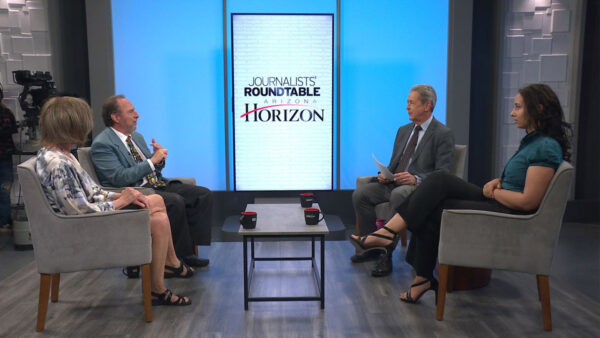Are Arizona students coming out of school prepared to meet the demands of employers in basic skills such as writing and math? We’ll take a look at a summer program that helps students get STEM jobs when they graduate college. Then, hear from Greater Phoenix Economic Council president and CEO Chris Camacho, Arizona Business and Education Council CEO Dick Foreman and 2015 Arizona Teacher of the Year John-David Bowman as they discuss what kind of skills employers expect from workers and what schools are doing to meet those needs.
TED SIMONS: Tonight's edition of Arizona education looks how summer school can mean a variety of things. Producer Shana fischer and Langston fields take us to one school where summer classes mean learning skills for the jobs of the future.
DYLAN HONG: It's a lot nicer to have one code than three or four.
SHANA FISCHER: Dylan Hong is paying it forward. This past spring he graduated from Phoenix country day school. He was captain of the robotics' team, and now he's teaching at summer school.
DYLAN HONG: I teach LEGO robotics and robotics with bobots.
SHANA FISCHER: He wants to inspire the next generation and spark a desire in the science and technology field.
DYLAN HONG: The pcds showed me know how much it is important to get kids becoming engineers.
SHANA FISCHER: While the summer school lineup at pcds is filled with subs like math and chemistry, there is also graphic design, digital photography and programming.
DYLAN HONG: This summer class is less of like oh, you flunked or you missed out and you have to redo it. It's more of laying down the groundwork for a kid to be interested in technology for the rest of their lives because when you have so much fun with it, it's hard not to be curious about what comes next.
SHANA FISCHER: Nichole Pope teaches rocket science, today is launch day. They spent most of the week building rockets and doing some fine tuning. Now, it's time to see if their trial and error has paid off.
KIDS: Three, two, one! It's going down!
It's going down!
It's going down!
SHANA FISCHER: Pope says the idea behind classes like hers is simply.
NICHOLE POPE: So what we're trying to accomplish by offering these classes, we really want to ignite students' interests and hopefully, steer them towards a career in some kind of science, technology, or engineering job. Usually, it's after the first launch that kids come back in the class. They get in my face. They say, this, Pope, this is what I want to do. This is the job that I want to have, like how do you get a job launching rockets or how do you get a job engineering these things? And it's really, really exciting to see.
SHANA FISCHER: Instead of spending his summer playing video games and hanging out, Kyle Odden is taking Hong's robotics' class.
KYLE ODDEN: Basically what we do is program robots to complete missions, some missions might be -- we have to flick a lever to take down the villain in the adventures. Sometimes, we would have to take the ice cores. If we get a lot of points, we win. And it is amazing.
SHANA FISCHER: And while he does love winning, kyle says he's coming away with something better. Knowing what he wants to be when he grows up.
KYLE ODDEN: I like mechanical engineering. Electrical engineering. And I want to invent stuff to help change the world because I like changing the world.
TED SIMONS: Dylan Hong is headed to Tufts University where he will major in engineering. Joining us to talk about what employers look for and how schools are preparing students is Chris Camacho, President and CEO of the greater Phoenix economic Counselor, Dick foreman, President and CEO of the education and business council. John David bowman, the 2015 Arizona teacher of the year. Good to have you here and thanks for joining us.
ALL: Thank you.
TED SIMONS: Congratulations to you on that award. Chris, we'll start with you, work readiness. When we talk about that, what are we talking about?
CHRIS CAMACHO: Companies today want to -- a market that producers people, people prepared for the workforce. We're seeing intense activity. To greet areas like information communication technologies, preparations for financial services, for advanced manufacturing. How companies are analyzing the markets is all about whether we have the people producing marketplace that allows the companies to go to scale.
TED SIMONS: The people producing marketplaces, are we -- the difference between preparing for work skills, work world. College preparedness. Is there a difference?
DICK FOREMAN: There is a difference. And I think one of the things that we need to grapple with better is career pathways. Preparing students for a number of different options, including college is great for a lot of them. A lot of them are ready to go into business. Others are more technically oriented. I think our schools have a massive obligation and responsibility to define which students are on which path and help them get there.
TED SIMONS: As a teacher, can you define that path. How do you do it?
JOHN-DAVID BOWMAN: Well, I think we have a growing career, technical area that, at our school in different districts, where we have welding, agriculture, auto mechanics, all these different programs that we're implementing. Really, you can select kids, but it's also the kids who -- the students who want to join those areas, they seek that out themselves.
TED SIMONS: So basically, it's not as difficult -- but you have to make it -- those that get out themselves, get attracted to them, don't you?
CHRIS CAMACHO: The way I look at it, we're seeing companies today, recognize the importance of the future technical labor force, whether that labor force is tied to vocational training, around welding or other advanced manufacturing programs. Certifications, or you know, it's a two-year technical path or a four-year path. We talked a bit about pathways before. This market. The next, in the next 20 years, how we, you know, manipulate or, actually, influence the ability for kids to get on the pathways to where the future job market is going to be, that's what companies care about today. Are we training the next engineer? Are we training the next skilled worker and technician, you know, technician capacity, you know, are we training the next teachers. I think that, in the future will drive our economic base, whether we have a lined workforce development education tied to the future jobs.
TED SIMONS: What about soft skills? Behavioral skills? The ability to work with others, controlling yourself, showing up to work on-time. Can you teach that in high school?
DICK FOREMAN: I think that you can. And I think that you can model it, more importantly, with your curriculum. With your insistence on high standards. Many of the classic liberal arts programs that are popular now really focus on communications, social skills, working with others. There is no magic wand that says that there is a perfect solution for every student. But there is a lot of good evidence out there that we can do a better job.
TED SIMONS: Have we changed that line of instruction over the years?
DICK FOREMAN: You know, I think that the line, unfortunately, and maybe John David can comment on this more effectively, a lot of this has been built around accountabilities that have been set, so there is this teaching to a test phenomenon we experience. I don't know that that's necessarily what Chris is talking about, with what the business community needs. I don't think that it's necessarily what the teachers want to do. We have got to be careful that our curriculum is broad-based, arts and science and is music, play a huge role in the learning experience. Stem courses, technical courses, career pathways is a complex thing. The real bottom line is we need student engagement to keep them in school.
TED SIMONS: What do you see as a teacher along those lines?
JOHN-DAVID BOWMAN: Well, I would say, in terms of the teaching interpersonal communication. Our being able to articulate your thoughts, to be able to behave, show up on time, those things can be taught in high school, or younger. I do think that, you know, with things like college and career standards, some of the things that teachers were implementing, the strategies they are using, it's very different than maybe the vision of a 1950's classroom where everyone just sits, all the rows in the desk. We just do our work on a worksheet for 55 minutes. If you go to -- if you get out there and go into the classrooms, in Arizona, you are going to see teachers, interacting with students, students in small groups and people working to develop the communication skills on a daily basis.
TED SIMONS: When you talk to businesses, they are thinking of relocating here? They are thinking of figuring out whether they want to stay here. What did they say as far as the skills that they are looking for, what they need?
CHRIS CAMACHO: So, John David talked a lot about the applied teaching. I think that a lot of that is occurring in our education system today, what companies are looking for You know, both the soft skills and hard skills because going back to the pathway's conversation, they don't want to come to a market that -- where they feel that as they are trying to attract workers within their, you know, domain area, that the market is going to be Cannibalized by one particular company coming to a market. So, with State Farm, comes to the markets, to bring thousands of jobs, they don't want to see the discover card and amx cannibalize the workforce. Rather, they would like to see a continued pipeline. Insuring that we have our education system, both K-12 to align with the post-secondary system, with participation from industry. So, one thing that I have really worked to do is integrate along with apec, to integrate the private sector into this conversation because that is the future of really insuring that we have the right pipeline for a student and ultimately the workforce.
TED SIMONS: Can that integration include internships, apprenticeships? Or are we going too far back to the Charles dickens' days?
DICK FOREMAN: I think that's extremely relevant. Maybe we could learn from Charles dickens. We should probably reread. The fact is internships are extremely valuable. Work experiences are extremely valuable. That goes back to again, what John David was talking about. Those are practical, social skills being applied in a real-life setting. We'll take all the internships that we can get and say thank you twice.
TED SIMONS: And as far as again, the career building, versus a general education, mentioned tests and those sorts of things, what do you think? Accountability is huge, obviously, these days. But, what businesses are looking for, can you --
TED SIMONS: Well, can you test it and can a test improve on those skills?
JOHN-DAVID BOWMAN: You know, I think that there is a place for assessments. I do think that we have maybe too much of an emphasis, or we have too many tests throughout a school year. I don't know if there is a written exam that is necessarily going to test whether a student is going to be able to have great interpersonal communication skills or be able to work well with others. So, I think that tests serve a place, in the curriculum because you have to -- there is things that they need to be held accountable for and you need an assessment, but I don't know if there is one that's going to test for, can you show up. Do you show up, check yes or no.
TED SIMONS: Do you have integrity?
Ten seconds. One-word response, or as close as you can, magic bullet, what would you like to see?
CHRIS CAMACHO: Economic developers can't do anything in one word. I would like to see more alignment.
TED SIMONS: What would you like to see?
DICK FOREMAN Student engagement.
TED SIMONS: Student engagement. Interesting.
TED SIMONS: Teacher of the year, what do you want to see?
JOHN-DAVID BOWMAN: So many things. I would like to see more of a highlight on the positive things that are going on in education.
TED SIMONS Great discussion. Thanks for joining us.
ALL: Thank you.
Chris Camacho:Greater Phoenix Economic Council president and CEO,Dick Foreman:Arizona Business and Education Council CEO, John-David Bowman:2015 Arizona Teacher of the Year




















